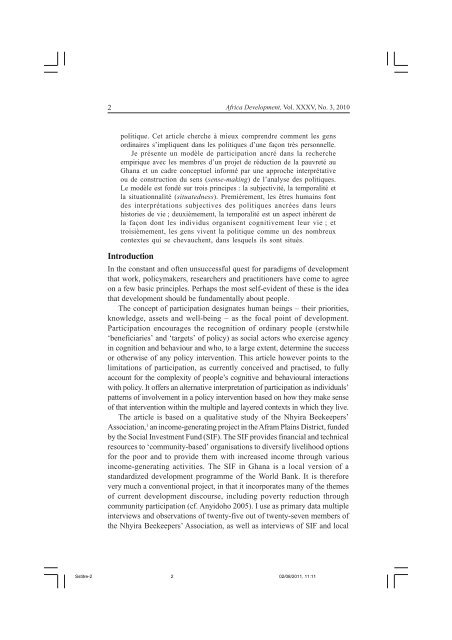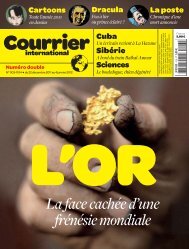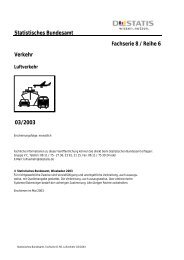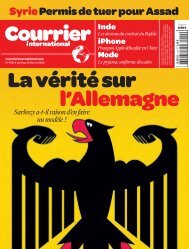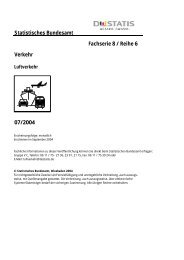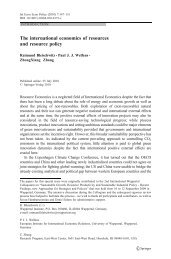lieux (publics) de ville » par les mots ou comment les murs - Index of
lieux (publics) de ville » par les mots ou comment les murs - Index of
lieux (publics) de ville » par les mots ou comment les murs - Index of
You also want an ePaper? Increase the reach of your titles
YUMPU automatically turns print PDFs into web optimized ePapers that Google loves.
2 Africa Development, Vol. XXXV, No. 3, 2010<br />
politique. Cet article cherche à mieux comprendre <strong>comment</strong> <strong>les</strong> gens<br />
ordinaires s’impliquent dans <strong>les</strong> politiques d’une façon très personnelle.<br />
Je présente un modèle <strong>de</strong> <strong>par</strong>ticipation ancré dans la recherche<br />
empirique avec <strong>les</strong> membres d’un projet <strong>de</strong> réduction <strong>de</strong> la pauvreté au<br />
Ghana et un cadre conceptuel informé <strong>par</strong> une approche interprétative<br />
<strong>ou</strong> <strong>de</strong> construction du sens (sense-making) <strong>de</strong> l’analyse <strong>de</strong>s politiques.<br />
Le modèle est fondé sur trois principes : la subjectivité, la temporalité et<br />
la situationnalité (situatedness). Premièrement, <strong>les</strong> êtres humains font<br />
<strong>de</strong>s interprétations subjectives <strong>de</strong>s politiques ancrées dans leurs<br />
histories <strong>de</strong> vie ; <strong>de</strong>uxièmement, la temporalité est un aspect inhérent <strong>de</strong><br />
la façon dont <strong>les</strong> individus organisent cognitivement leur vie ; et<br />
troisièmement, <strong>les</strong> gens vivent la politique comme un <strong>de</strong>s nombreux<br />
contextes qui se chevauchent, dans <strong>les</strong>quels ils sont situés.<br />
Introduction<br />
In the constant and <strong>of</strong>ten unsuccessful quest for <strong>par</strong>adigms <strong>of</strong> <strong>de</strong>velopment<br />
that work, policymakers, researchers and practitioners have come to agree<br />
on a few basic princip<strong>les</strong>. Perhaps the most self-evi<strong>de</strong>nt <strong>of</strong> these is the i<strong>de</strong>a<br />
that <strong>de</strong>velopment sh<strong>ou</strong>ld be fundamentally ab<strong>ou</strong>t people.<br />
The concept <strong>of</strong> <strong>par</strong>ticipation <strong>de</strong>signates human beings – their priorities,<br />
knowledge, assets and well-being – as the focal point <strong>of</strong> <strong>de</strong>velopment.<br />
Participation enc<strong>ou</strong>rages the recognition <strong>of</strong> ordinary people (erstwhile<br />
‘beneficiaries’ and ‘targets’ <strong>of</strong> policy) as social actors who exercise agency<br />
in cognition and behavi<strong>ou</strong>r and who, to a large extent, <strong>de</strong>termine the success<br />
or otherwise <strong>of</strong> any policy intervention. This article however points to the<br />
limitations <strong>of</strong> <strong>par</strong>ticipation, as currently conceived and practised, to fully<br />
acc<strong>ou</strong>nt for the complexity <strong>of</strong> people’s cognitive and behavi<strong>ou</strong>ral interactions<br />
with policy. It <strong>of</strong>fers an alternative interpretation <strong>of</strong> <strong>par</strong>ticipation as individuals’<br />
patterns <strong>of</strong> involvement in a policy intervention based on how they make sense<br />
<strong>of</strong> that intervention within the multiple and layered contexts in which they live.<br />
The article is based on a qualitative study <strong>of</strong> the Nhyira Beekeepers’<br />
Association, 1 an income-generating project in the Afram Plains District, fun<strong>de</strong>d<br />
by the Social Investment Fund (SIF). The SIF provi<strong>de</strong>s financial and technical<br />
res<strong>ou</strong>rces to ‘community-based’ organisations to diversify livelihood options<br />
for the poor and to provi<strong>de</strong> them with increased income thr<strong>ou</strong>gh vari<strong>ou</strong>s<br />
income-generating activities. The SIF in Ghana is a local version <strong>of</strong> a<br />
standardized <strong>de</strong>velopment programme <strong>of</strong> the World Bank. It is therefore<br />
very much a conventional project, in that it incorporates many <strong>of</strong> the themes<br />
<strong>of</strong> current <strong>de</strong>velopment disc<strong>ou</strong>rse, including poverty reduction thr<strong>ou</strong>gh<br />
community <strong>par</strong>ticipation (cf. Anyidoho 2005). I use as primary data multiple<br />
interviews and observations <strong>of</strong> twenty-five <strong>ou</strong>t <strong>of</strong> twenty-seven members <strong>of</strong><br />
the Nhyira Beekeepers’ Association, as well as interviews <strong>of</strong> SIF and local<br />
Sstitre-2 2<br />
02/08/2011, 11:11


